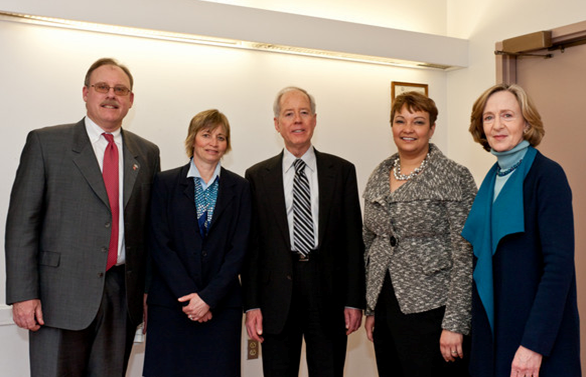
In MIT visit, Lisa Jackson discusses how technology can affect government regulations.
Technological innovations have the ability to change environmental policies just as much as those policies can affect innovation, U.S. Environmental Protection Agency (EPA) Administrator Lisa P. Jackson said during a visit to MIT on Friday, Apr. 15. In delivering the annual Henry W. Kendall Memorial Lecture, Jackson urged students and faculty at the Institute to look for sustainable solutions to environmental problems.
Jackson, a chemical engineer, addressed the relationship between science and environmental policy, and spoke about the chicken-and-egg nature of her job. “How do we implement the laws we have, and try to make sure we don’t stifle innovation … but also ultimately realize we need legislation to get there?” she said.
She noted that environmental policies often act as incentives for scientists to develop new technologies. At the same time, new inventions can spur changes in environmental laws. “We catalyze each other,” she said.
A symbiotic relationship between science and environmental policy is especially crucial for the issue of climate change, Jackson said. Earlier this month, members of Congress drafted measures that would have prevented the EPA from regulating carbon dioxide and other greenhouse gases under the Clean Air Act, a “fairly draconian move,” according to Jackson. The Senate failed to pass the measures, and President Barack Obama has said he would veto any similar bills in the future.

Photo credit: Manohar Balagatte Srikanth
But the issue is likely not dead, Jackson said, and when it comes time for Congress to draft the federal budget for 2012, “we’ll probably see this battle played out again.” In the meantime, provided the EPA’s authority remains intact, the agency will start to set milestones for industries — the energy sector in particular — to curb greenhouse gas emissions, she said. Looking ahead, Jackson said she would like to see the conversation on climate change shift from politics to science, to focus on developing technologies to minimize greenhouse gas emissions. Such innovations, she hopes, could ultimately push climate change policy forward.
“I think we do have policy cobwebs all over the place right now,” Jackson said. “I will admit I have a bias that leads me to believe — partly as an engineer — that we have to not settle for standards that are not progressive enough.”
[More... ]

